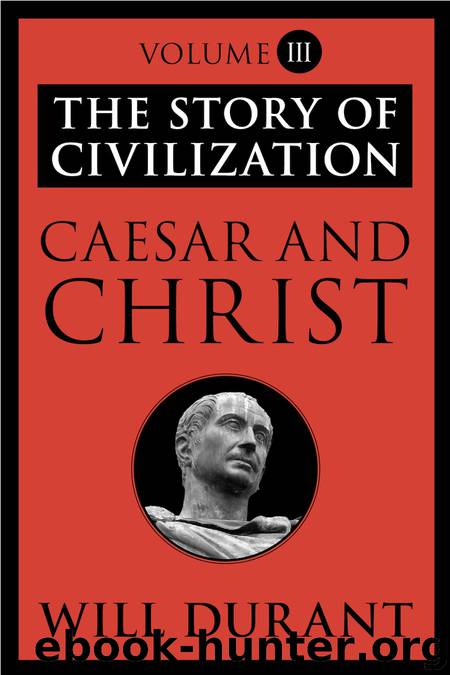The Story of Civilization: Volume III: Caesar and Christ by Will Durant

Author:Will Durant
Language: eng
Format: epub
Publisher: Simon and Schuster
VII. THE NEW FAITHS
Religion accepted the games as proper forms of religious celebration and inaugurated them with solemn processions. The Vestal Virgins and the priests occupied seats of honor in the theaters, at the circus, and before the arena. The emperor who presided was the high priest of the state religion.
Augustus and his successors had done everything they could to revitalize the old faith, except to live moral lives; even the declared atheists among them, like Caligula and Nero, had carried out all the ritual traditionally due the official gods. The Luperci priests still danced through the streets on their festival day; the Arval Brethren still mumbled prayers to Mars in old Latin that no one could understand. Divination and augury were assiduously practiced and widely trusted; all but a few philosophers believed in astrology, and the emperors who banished astrologers consulted them. Magic and sorcery, witchcraft and superstition, charms and incantations, “portents” and the interpretation of dreams were deeply woven into the tissue of Roman life. Augustus studied his dreams with the diligence of a modern psychologist; Seneca saw women sitting on the steps of the Capitol waiting the pleasure of Jupiter because their dreams had told them they were desired of the god.123 Every consul celebrated his inauguration by sacrificing steers; Juvenal, who could laugh at everything else, piously slit the throats of two lambs and a young ox in gratitude for the safe voyage of a friend. Temples were rich with gold and silver offerings; candles burned before the altars; the lips, hands, and feet of divine images were worn by the kisses of the devout. The old religion seemed still vigorous; it created new gods like Annona (gatherer of the world’s corn for Rome), put new life into the worship of Fortuna and Roma, and gave powerful support to law, order, and tyranny. If Augustus had returned a year after his death he might well have claimed that his religious revival had proved a happy success.
Despite these appearances the ancient faith was diseased at the bottom and at the top. The deification of the emperors revealed not how much the upper classes thought of their rulers, but how little they thought of their gods. Among educated men philosophy was whittling away belief even while patronizing it. Lucretius had not been without effect; men did not mention him, but merely because it was easier to practice epicureanism than to study Epicurus or his passionate expositor. The rich youths who went to Athens, Alexandria, and Rhodes for higher education found no sustenance there for the Roman creed. Greek poets made fun of the Roman pantheon, and Roman poets leaped to imitate them. The poems of Ovid assumed that the gods were fables; the epigrams of Martial assumed that they were jokes; and no one seems to have complained. Many of the mimes ridiculed the gods; one whipped Diana off the stage, another showed Jove making his will in expectation of death.124 Juvenal, like Plato five centuries before him
Download
This site does not store any files on its server. We only index and link to content provided by other sites. Please contact the content providers to delete copyright contents if any and email us, we'll remove relevant links or contents immediately.
What's Done in Darkness by Kayla Perrin(26083)
Shot Through the Heart: DI Grace Fisher 2 by Isabelle Grey(18659)
Shot Through the Heart by Mercy Celeste(18558)
The Fifty Shades Trilogy & Grey by E L James(18295)
The 3rd Cycle of the Betrayed Series Collection: Extremely Controversial Historical Thrillers (Betrayed Series Boxed set) by McCray Carolyn(13699)
The Subtle Art of Not Giving a F*ck by Mark Manson(13654)
Scorched Earth by Nick Kyme(12366)
Stepbrother Stories 2 - 21 Taboo Story Collection (Brother Sister Stepbrother Stepsister Taboo Pseudo Incest Family Virgin Creampie Pregnant Forced Pregnancy Breeding) by Roxi Harding(12286)
Drei Generationen auf dem Jakobsweg by Stein Pia(10607)
Suna by Ziefle Pia(10531)
Scythe by Neal Shusterman(9818)
International Relations from the Global South; Worlds of Difference; First Edition by Arlene B. Tickner & Karen Smith(9139)
Successful Proposal Strategies for Small Businesses: Using Knowledge Management ot Win Govenment, Private Sector, and International Contracts 3rd Edition by Robert Frey(8944)
This is Going to Hurt by Adam Kay(8477)
Dirty Filthy Fix: A Fixed Trilogy Novella by Laurelin Paige(7061)
He Loves Me...KNOT by RC Boldt(6414)
How to Make Love to a Negro Without Getting Tired by Dany LaFerrière(6375)
Interdimensional Brothel by F4U(5880)
Thankful For Her by Alexa Riley(5697)
